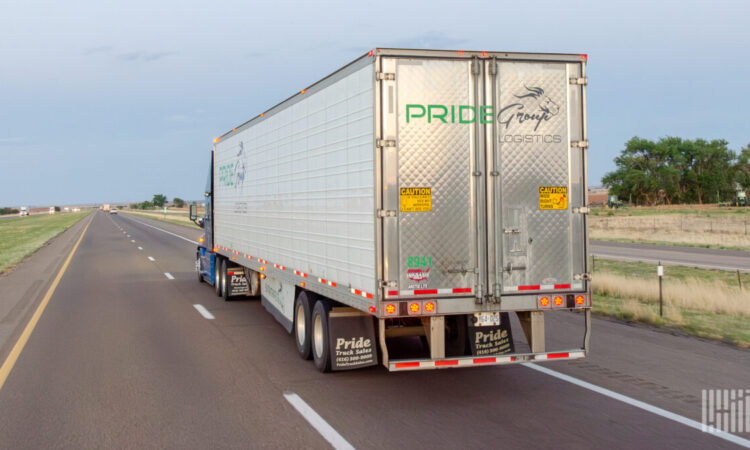Canada-based truckload carrier owes over $637 million, lenders say
After Pride Group, one of Canada’s largest trucking and leasing companies, filed for bankruptcy protection last week amid a capacity glut and low rates, President and CEO Sulakhan “Sam” Johal is warning that an “unorganized demise” of the company threatens “the livelihoods of many thousands of families.”
The company was founded by Johal and his brother Jasvir Johal, vice president, in 2010. It operates 50 owned and leased locations across Canada and the U.S., controlling a fleet of 20,000 tractor-trailers that are owned, leased, contracted for service, serviced or securitized by Pride Group. It offers domestic and cross-border transportation services in Canada and the U.S. and operates truck dealerships and service centers in both countries.
The Mississauga, Ontario-based company was profitable until the pandemic, according to Sam Johal. Following the downturn across the trucking industry after the pandemic, the family-owned company was unable to pay its debts.
“Increased spot freight prices, and low diesel prices and interest rates during the pandemic led to an increase in trucking and logistics supply,” the company said in its bankruptcy filing in the Ontario Superior Court of Justice. “This ultimately resulted in an oversupply of trucking and logistic services which resulted in declining spot freight prices at the same time that diesel prices and interest rates went back up.
“This simultaneous reduction in pricing and increase in costs negatively impacted the Pride Group’s revenue, while also decreasing the demand for truck sales, because the industry was no longer viewed as a good investment for the new owner-operators that form the foundation of the Pride Group’s customer base.
“The foregoing headwinds combined to put tremendous pressure on [Pride Group’s] business, which had grown exponentially due to the demand during the COVID-19 Pandemic.
“By December 2023, many of the lenders either cut off availability under their facilities or the facilities maxed out, which hindered the [Pride Group’s] ability to fund new inventory and lease sales. As a result, the [Pride Group] had nominal cash sales and no new lease sales in January 2024. Without the ability for the [Pride Group] to provide leasing options to customers (because of the frozen leaseline financing facilities), sales have fallen substantially and liquidity has been severely impacted.”
More than 20 lenders have claims totaling more than $637 million in debt from Pride Group, including financial institutions such as Mitsubishi Capital ($88.3 million), Daimler Truck Financial Canada ($193 million), Daimler U.S. ($69.7 million), Paccar Financial ($46.9 million) and Volvo Financial Services Canada ($9.8 million).
The Pride Group directly employs 669 people, including 369 in Canada, 200 in India and 100 in the United States. The company also has 405 independent contractors, including 369 individuals in Canada.
Pride Group filed Thursday for creditor protection under the Companies’ Creditors Arrangement Act (CCAA) in Canada, which gives the company a stay of proceedings for at least 10 days.
“We have taken these steps to commence the CCAA proceedings and to seek recognition under the Chapter 15 cases so that we can maintain our current operations, stabilize our business, establish governance controls and monitoring, and develop a plan to restructure for the benefit of our stakeholders. We believe this is in the best interests of all of our employees, customers, business partners and other stakeholders,” the company said in a news release.
The bankruptcy protection filing came after Mitsubishi HC Capital filed lawsuits accusing the Pride Group of defaulting on payments they had personally guaranteed. Mitsubishi HC Capital is seeking damages of $100 million in the lawsuits.
Sam Johal said if the company is unable to reorganize and is forced to cease operations, the closure could have ripple effects throughout the trucking industry. Many of the Pride Group’s customers and drivers are from the Southeast Asian community, according to court documents.
“The fallout from an unorganized demise of the Pride Group on the Canadian and U.S. owner-operator trucking communities in particular will be catastrophic, as will the spiral effects on all of the businesses that they support in their local communities. The livelihoods of many thousands of families are at stake,” according to Sam Johal.


